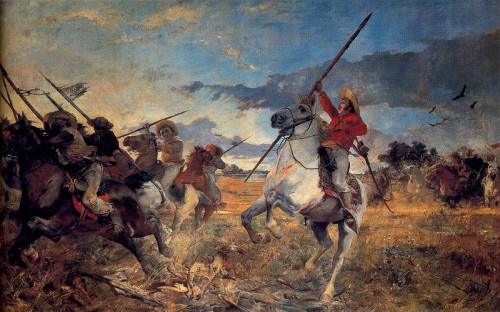The Coup
by Israel Centeno and translated by Alex Higson / September 24, 2013 / No comments
Fiction and reality blur on a crumbling internet.

'Vuelvan Caras' by Arturo Michelena, depicting the Battle of Las Queseras del Medio. Photo: Wikimedia.
When he’d finished his coffee, S rushed to turn on the computer. Despite having gone days without sleep thanks to his obsessive chat room flirtations, he still had high expectations for a philosophical chat with some existentialist Maghrebis. Online conversations broke up the monotonous routine of his life. On the internet he felt immersed in an adventure of small, significant, and revolutionary proportions.

- From his lonely watch post Albert Camus asked who among us has not experienced exile yet still managed to preserve a spark of fire in their soul. “We’re all alone,” Natalia Sedova cried in exile on hearing of her husband Leon Trotsky’s affair with Frida Kahlo. In his novel Night Watch, Stephen Koch follows the incestuous love affair of David and Harriet, wealthy siblings watching the world from their solitary exile. Koch’s writing, Camus’s theories, and Trotsky’s affair all come back to exile and lead me to reflect on the human condition. From my own vantage point, my Night Watch, I will reflect on my questions of exile, writing, and the human condition.

- Israel Centeno was born in 1958 in Caracas, Venezuela, and currently lives in Pittsburgh as a Writer-in-Residence with City of Asylum/Pittsburgh. He writes both novels and short stories, and also works as an editor and professor of literature. He has published nine books in Venezuela and three in Spain.
Once he’d connected, he paused for a second to choose a discussion board. Freedom, blessed freedom, he almost exclaimed. He smiled as he opened the forums, contributed poems and chance thoughts, welcomed new aficionados, and got up to date on community gossip. Above all, in the Literature forum he read posts by J, an interesting user of renowned wisdom, who was both obsessive and malicious. J drank pisco sour and she was vindictive, which is typical of the people who live in the remote regions of the Atacama.
It was a surprise to S—a sensitive man who, upon getting up in the morning, usually thought about two or three things: a) a woman’s dulce cogollo, b) a woman’s amargo cogollo, and c) a woman’s salado cogollo—to notice that his favorite page was not online. Then, when he spotted major differences in the internet at large he was thrown into the trifling anxiety that precedes a heart-attack. Not only had old comments disappeared from the web—The horror!, as someone from the old political salon might say—but so too had various social networks, his friends’ email addresses, and the site where he’d meet with M, uncertain but real—the only place where he could express the feelings he experienced: Love, elusive, materialized in digits.
A bitter taste ran from his tongue down through his gastrointestinal tract to the mouth of his stomach; swallowing became a timid belch, a Gallic “oh, oh.” But before he could react, he had received sixty-nine alerts from a sociopath who claimed to be blocking his internet access from alternate network connections. He scratched his scraggy, skinny back. He had no fucking idea what this new scenario meant. He refreshed his inbox and found some strange messages. J, frenzied, in some remote, nonexistent place, was impotently stewing in her rage. With some friends she had organized the digital resistance on an archaic server.
A virtual coup d’état was making its totalitarian advance.
S was lost in his fury. He realized that his old friends, with whom he had shared revolutionary ambitions and hopes in these online communities, had passed into exile, outside the realm of Java, Twitter, and Facebook. Others, stupefied in their aimless surfing, bewildered in their performance of a loyalty that exposed them to the scrutiny of the most demanding users, with no place to hang themselves, self-medicated with SSRIs. The rest served as a new rescue mob: They closed ranks to defend themselves from the effects of the virus, attacked any binary agents thought to be resistant to the changes of the cyber-revolution, came to the aid of friends lost in uncertainty, and denounced the manipulation of innocent email users to deaf institutions.
S soon found a new status quo posted on the walls of social networks. It was an ambiguous message that at times insulted him, at times questioned him, and, definitively, belittled him. It was a kind of perverse and decadent compendium that distorted the agoras he used to hang out in: Odd dreams, endless searches for Arcadia, the free game of stupidity versus intelligence in one hundred and forty characters—the crude expression of knowledge and audacity of the minimum wisdom applied to sensual stimulation—a message from the cities that stung him or questioned him and, definitively, passed over him.
His heart skipped a beat; that morning, reality caught in his throat. He wanted to download the latest single by a Guyanese singer-songwriter in an outdated audio format, but whoever usually uploaded them was broken down on the information superhighway: A deserter, disappeared, taken prisoner, a moribund surfer. He waited in vain for some invasion from the cantankerous J, but she was terminally locked up, chewing her rage and spitting it out inside a shoe. In an act of desperation, S attempted to write a joke to exorcise a state of energy from these illegible prognoses, but he found no echo in the unfathomable, frivolous(?) universe. The bitter taste of treachery and demoralization froze him.
The sun came imperious through S’s window as it rose to the East of the city’s great mountain. The metropolis seethed. S sat locked inside himself, in front of his screens, whistling that song by La Ley— “Without pain you can’t be happy”—smiling manically from time to time. He was void. God knew how much. He let out a moan that disturbed his Australian parakeet, who hopped happily in his rusty cage, a painful, steady and tragic moan. He wanted his friends. He wanted to go back to the streets, to smoke and watch the gazelles run, to savor the perfume of the women who clap to one side and then the other, in a steady rhythm. The internet meant fuck-all to him; he wanted to run around like General Páez in the Battle of Las Queseras del Medio and shout out a stunning “Vuelvan caras!” (“About face!”) at all those who caused his misfortune.
S opened his desk drawer, took out the Beretta that he kept to use against the delinquents who ravaged the city. The grandiose mountain was disconnected. He got up. Roaring with laughter, he put the barrel of the gun into his mouth. The guacharaca birds were startled in the tops of the chaguaramo palms, and flew off across the Caracas sky. Blue commotion reigned that Sunday.




